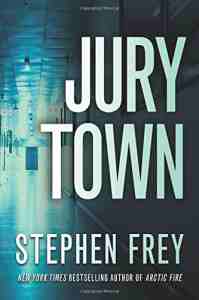Jury Town by Stephen W. Frey
 Monday, October 5, 2015 at 9:16AM
Monday, October 5, 2015 at 9:16AM 
Published by Thomas & Mercer on September 29, 2015
The notion of “professional jurors” has been floated from time to time, usually by insurance companies that think people who work full-time as jurors will award less compensation to injury victims than jurors who are randomly chosen from the community. It’s a bad idea that, for obvious reasons, never gains traction, but it forms the interesting (albeit unbelievable) premise upon which Stephen Frey built Jury Town.
Former Governor Victoria Lewis, who believes her father was once an innocent victim of a rigged jury, proposes to replace Virginia’s system of choosing jurors at random with a pool of 200 professional jurors who would decide all civil and criminal cases. That seems like a system that would be ripe for corruption but the system proposes to solve that problem by having the jurors listen to evidence on television while living in a compound, isolating them from potential bribes. Their impartiality would be guaranteed by cutting them off from contact with the outside world. They live in a remodeled prison but they’re paid a lot of money to do it.
Without internet access or news coverage, the professional jurors would be remarkably ignorant of current affairs, which hardly makes them ideal representatives of the community, which is what a jury is meant to be. In criminal cases, the system would probably be unconstitutional, but in Frey’s novel the Virginia Supreme Court has managed to railroad the project into existence. The process of selecting the jurors for their two year terms is a secret that the public isn’t entitled to know. None of this is remotely plausible but this is a work of fiction so I was willing to roll with the premise at least initially. Unfortunately, I lost my willingness to suspend disbelief well before the novel's end.
Against this background, the plot involves a group of people known as the Grays who operate a widespread jury tampering scheme, influencing verdicts for their own financial gain. The novel’s other key player is Angela Gaynor, a state senator who aspires to a U.S. Senate seat with the endorsement of her best friend, recently retired from the NBA. The Grays need Gaynor’s opponent to win reelection. There are also a couple of fellows who are trying to make a killing with online gaming software and a Chinese investor. Both of these collateral plotlines get tangled up in the main story in ways that are hard to believe, but they are no harder to believe than the main story.
Conspiracy thrillers have become increasingly outlandish over the years. Jury Town is hard to swallow on a number of levels. I’m willing to suspend my disbelief for the sake of a good story but Jury Town challenged my ability to do that. Talking about all the things I didn’t buy would require revealing too much of the story, so I will only say that the Grays, Lewis, and other characters do a number of things that advance the plot while detracting from its credibility. And as evil characters go, the foot-stomping Grays (all predictably holding high level government positions) are too silly to take seriously.
I like Stephen Frey’s ability to move a story forward and to fashion protagonists that exhibit human flaws. He is particularly strong when he relies on his financial background. In Jury Town, however, he moved away from his strength and built a story on a weak premise that collapses under the weight of the implausible story it supports. Granted, Jury Town is an easy read with some fun moments. I suspect that readers who are able to buy into the premise will enjoy it more than I did.
RECOMMENDED WITH RESERVATIONS